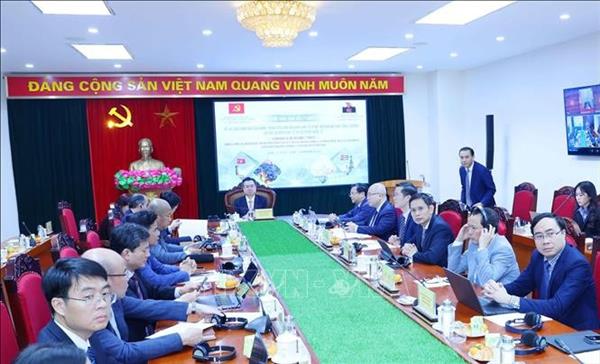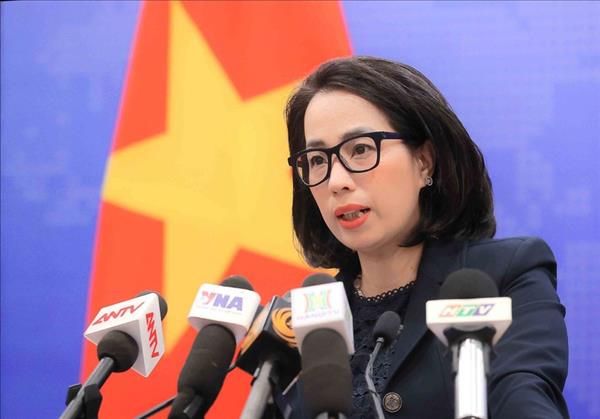The interview was granted to the VNA on the threshold of the 44th Executive Board Meeting (EBM) of the Organisation of Asia-Pacific News Agencies (OANA) in Hanoi from April 18-20, the theme of which is “For a professional and innovative journalism”.
Following is the full text of the interview.
Reporter: What do you think about the theme of the 44th OANA Executive Board Meeting and issues on the agenda of this event?
Mrs. Nurini Kassim: The theme is highly relevant in the world of media today. Professionalism in journalism is needed more than ever due to the emergence of social media and the challenges it poses to the trade.
While the rapid development of social media has brought along many positive changes, some negative side effects have been observed. The rising trend of citizen journalism has provided many stories of popular and public interest, but the veracity of the information can be questionable and opinionated. This misinformation could then become widespread online and through social media.
This lack of professionalism has its ramifications as, unchecked, it could drag a society or even a country into political or economic instability and social unrest. This lack of accountability threatens the ethical reporting by the mainstream and traditional media.
This is where professional journalism can play a key role, something that news agencies can be proud of, where our journalists and reporters are carefully trained, not only with writing skills but along with the cardinal rules of journalism.
Unlike citizen journalists, professional journalists look at every aspect to come up with well-rounded and unbiased stories. In other words, professionalism journalism is founded on professional quality.
The work of professional journalists encompasses credibility, ethical reporting, accountability, responsibility, quality reporting, and fact checking and verification - a combination necessary to ensure nation building, peace, racial harmony, and political and economic stability.
The credibility of a news organisation rests on the professionalism of its journalists.
Innovation Journalism
The dictionary defines innovation as the process of translating an idea or invention into a product or service that creates value or for which customers will pay.
It also says that innovation involves deliberate application of information, imagination and initiative in deriving greater or different values from resources, and includes all processes by which new ideas are generated and converted into useful products.
Peter Drucker, a leading authority on entrepreneurship and innovation, says innovation involves finding a new and better way of doing something.
Conclusively, if I may say so, innovation is about change and progress, both built into one. By extension, innovative journalism or innovation journalism is about transcending the traditional journalistic approach to writing.
Hence, it is imperative that journalists are equipped to deal with this change. For example, when reporting on a new technology, they will need to have a good understanding of, among others, the technology, the company that developed the technology, the techniques of marketing the technology, the business model of the company and the viability of the company.
Innovative journalism also encompasses the use of various platforms for story-telling, which I will elaborate under Issue No. 1 of the Agenda.
Agenda: 1) News Agencies’ strategies to cope with the shift of news content consumption behaviour, focusing on video content and the Youtube platform
The growth of digital news and social media has prompted many people, particularly the young, to shift their attention from print material such as newspapers to videos and the YouTube for news and information.
The fast-paced world is denying them the time needed to pore over printed text. At the same time, they prefer the faster, shorter and live information brought to them over the YouTube and other video platforms on their mobile devices.
The mainstream media, realising that this trend can eventually put it out of business, has rushed to have a presence on the new social media platforms such as Twitter, Instagram, Facebook and YouTube.
Bernama, the Malaysian National News Agency, is no exception. We have set up what is called a Multimedia Desk exclusively to disseminate news and information on these platforms. One other form of presenting news and information, by way of infographics, is also gaining momentum.
The feedback from users has been positive and encouraging, an indication that our increased focus on this news consumption behaviour is timely.
BERNAMA has also introduced a Front Desk digital news service that focuses on human interest and soft news, entertainment news, and video and photo news to cater to the growing number of consumers in this segment.
The Facebook Front Desk Arabiya (FDA) account disseminates news, video clips and photos to cater to consumers conversant in Arabic.
2) Fake News and Fact-checking Journalism
Fake news was almost unheard of some years ago but today it is one of the greatest threats to democracy and free debate.
Citizen journalists, in their haste to post information on social media, are usually guilty of circulating unverified news.
Fake news can only be checked by the publication of news and information after verification.
It is important for news agencies to have fact-checkers, like the key media outlets in the United States, to examine and verify news before it is published.
For example, during the US presidential election debates, news outlets checked and verified the facts in the speeches delivered by the candidates.
We should not compromise truth, accuracy and accountability for speed.
In the case of advertorials, companies will usually feed news agencies with whatever information they want them to disseminate. However, the news agencies must always give priority to consumer interest and ensure that the companies do not attempt to disseminate content which is not truly reflective of what they claim.
3) Regain public trust in mainstream news
The challenge today is for the mainstream media, which is slowly losing out to social media as the main source of news and information, to regain the trust of the public, especially the younger generation.
People who prefer the alternative media do not trust the mainstream media. It is not an easy task for the mainstream media to regain the trust of the public. Nevertheless, it is not a battle that cannot be won. We have to innovate and come up with the right strategies.
One strategy is to maximise the use of the multimedia platforms such as Twitter, WhatsApp, YouTube and Facebook, by coming out with more human interest, lifestyle and entertainment stories that are more compact and easily understood.
Another is to avoid churning out biased news. Despite the transformation in the field of information dissemination, many people still yearn for truth in the news they digest.
News agencies must engage in constructive journalism and not just harp on negative issues that can turn away consumers.
Reporter: What is Bernama’s development strategy and its policy for cooperation within the OANA?
Mrs. Nurini Kassim: BERNAMA’s vision is to become a renowned news agency which is recognised internationally.
Its mission is to produce and disseminate news and information in an accurate, speedy, fair and objective manner in the nation's interest; to mould an informed society in line with the New Malaysia; to generate revenue through diversification of news and information products; to enhance the standard of journalism in the country by offering challenging and rewarding careers; to use the latest technology in service delivery; and to fulfil the needs of clients at all times.
In keeping with the vision and mission, BERNAMA aims to grow its news agency, radio and television services professionally and spread its wings beyond Malaysia to be a regional and, eventually, world player.
In tandem, we want OANA to continue to be a reliable and credible and the leading organisation of Asia Pacific news agencies for the betterment of the member countries.
With the existence of OANA, we are able to source news on a wide range of topics and perspectives without being overly dependent on the Western-centric media.
Towards that end, our policy is to further strengthen our cooperation with all OANA members by actively sharing news, photos and videos to ensure that OANA remains relevant in the ever-transforming field of news and information.
We are open to working with all member countries to explore new areas of cooperation through OANA.
Reporter: Thank you very much.
VNA/VNP

















